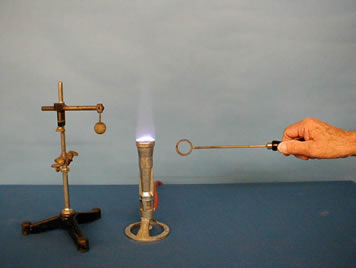Demos: 3A-02 Expansion Ball & Ring

A metal ball and ring, each made of the same material, are made in such a way that at the same temperature, the inside diameter of the ring is just slightly larger than the diameter of the ball so that the ball will barely pass through. If the ball is heated, it will expand and not be able to be passed through the ring. If the ring and ball are both heated to the same temperature, the ball will pass through once again. The demo deals with the intuitive notion that the “hole” in the ring will get smaller as the ring is heated.
Directions: Pass the ball through the ring while each is at room temperature. The ball may “stick” slightly as it passes through, but this reinforces the fact that it is a tight fit. Next, place the ball in the flame of the burner and allow it to get very hot. Then try to pass it through the ring. It will not go through. After asking the students what will happen if the ring is also heated, place both the ball and the ring in the flame. Now the ball will once again pass through the ring.
Suggestions for Presentation: Students will have no trouble in accepting the fact that the ball diameter will increase with heating. However, since metals expand when heated, many will believe that the metal will expand into the hole, making the hole smaller. The demonstration shows otherwise. Now ask the students to consider the fact that as the metal gets hotter, the molecules get farther apart. Imagine a “row” of molecules on the surface of the inside of the ring. In order for these to get farther apart, the circumference of the circle must get larger.
Applications: In manufacturing, if you want a ring to fit tightly over a rod, you would have to heat the ring.
Last Updated: Nov 30, 2023 11:25 AM